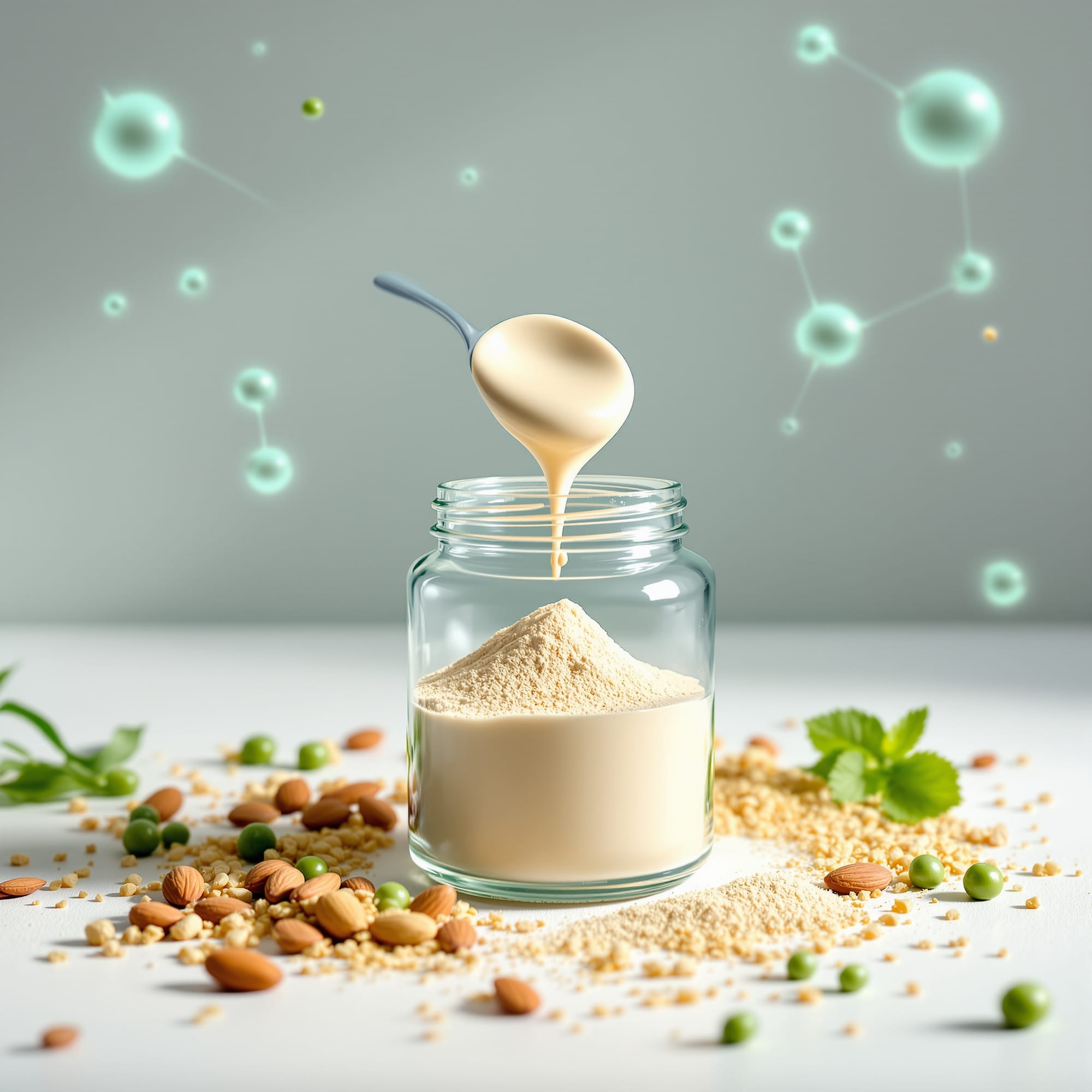Vegan Protein Powder: Benefits, Sources & Best Choices

Vegan protein powder is an excellent alternative for those seeking to incorporate plant-based proteins into their diet. Rich in essential amino acids, these powders offer numerous vegan protein benefits, making them ideal for athletes, fitness enthusiasts, and anyone looking to boost their protein intake without animal products.
In this article, we will explore various sources of plant protein powder, discuss their health advantages, and highlight some of the best options available in the market. Whether you're new to vegan diets or just looking for reliable protein sources, our guide will help you make informed choices.
What is Vegan Protein Powder: Benefits, Sources & Best Choices? | What are the benefits of vegan protein powder? | How to choose vegan protein powder effectively? | What are common mistakes with vegan protein powder? | How Can Vegan Protein Powder Benefit Your Nutritional Goals? | Frequently Asked Questions
What is Vegan Protein Powder: Benefits, Sources & Best Choices?
Vegan protein powder is a dietary supplement derived from plant sources that provides an alternative to animal-based protein products. Typically made from ingredients such as peas, brown rice, hemp, or soy, these powders serve as a convenient way to increase protein intake for individuals following a vegan or vegetarian diet. They are not only rich in essential amino acids but also come with a variety of health benefits, making them a popular choice among fitness enthusiasts and health-conscious consumers alike.
One of the main benefits of vegan protein powders is their ability to support muscle recovery and growth without the cholesterol and saturated fats often found in animal proteins. For instance, a study published in the Journal of Nutrition found that plant-based proteins can be just as effective as whey protein when it comes to muscle building, particularly when they offer a complete amino acid profile. When choosing a vegan protein powder, look for those that contain a blend of different sources to ensure a broad spectrum of nutrients. Popular brands often combine pea protein with rice protein to maximize the amino acid intake, making it easier for the body to utilize the protein efficiently.
What are the benefits of vegan protein powder?
Vegan protein powder offers numerous health benefits that make it an essential supplement for those following a plant-based diet. One of the primary advantages is that it provides essential amino acids required for muscle repair and growth. Research indicates that plant protein powders, such as those derived from pea, rice, and hemp, can support muscle protein synthesis similarly to whey protein. A study highlighted that individuals supplementing with plant protein post-exercise showed significant improvements in muscle mass.
Moreover, vegan protein powders are often easier to digest for many individuals, reducing the risk of gastrointestinal discomfort. Unlike some animal-based protein supplements, plant-based options minimize bloating and discomfort, making them suitable for those with lactose intolerance or milk allergies. This digestibility factor encourages more consistent use and allows users to integrate the powder into their daily diet without adverse effects.
Another significant benefit of vegan protein powder is its lower environmental impact compared to animal-based proteins. The production of plant protein requires fewer resources—such as water and land—and generates less greenhouse gas emissions. This sustainable aspect appeals to environmentally conscious consumers seeking to reduce their carbon footprint through dietary choices. Additionally, many plant-based protein sources contain beneficial phytonutrients and antioxidants that can enhance overall health and immune function.
- Rich in essential amino acids for muscle development.
- Better digestibility, suitable for lactose-intolerant individuals.
- Lower environmental impact compared to animal protein sources.
- Contains beneficial phytonutrients and antioxidants.
- Versatile in various dietary applications, from smoothies to baked goods.
How to choose vegan protein powder effectively?
Selecting the right vegan protein powder requires understanding its benefits and the sources from which it is derived. Vegan protein powders, made from peas, brown rice, hemp, and other plant sources, offer an excellent alternative to animal-based proteins. They are not only rich in essential amino acids but also come with the added benefits of higher fiber content and zero cholesterol. To effectively integrate vegan protein powder into your diet, pay attention to the ingredient list, and choose a product that fits your nutritional goals and taste preferences.
When considering which vegan protein powder to purchase, it’s essential to look at the protein content per serving, the amino acid profile, and any additional ingredients that might contribute to your overall health. For example, if you are training intensely, you may want to select a plant protein powder that has a complete amino acid profile to support muscle repair and growth. Additionally, consider how the protein fits into your meals; some powders mix well in smoothies, while others can be incorporated into baked goods or oatmeal.
- Research the protein sources: Common sources include pea, rice, hemp, and chia; choose one that aligns with your taste and dietary needs.
- Check for nutritional additives: Look for vitamin B12 and iron fortification, as these nutrients can be lower in vegan diets.
- Evaluate the texture and flavor: Some powders are gritty, while others are smoother; pick a flavor you enjoy to ensure consistent use.
- Consider your dietary preferences: Ensure that the powder is free from allergens such as soy or gluten if you have sensitivities.
- Try sample sizes: Before committing to a full-sized product, purchase sample packs to find the perfect match for your palate and lifestyle.
What are common mistakes with vegan protein powder?
One of the most frequent misconceptions regarding vegan protein powder is the belief that all plant-based protein sources are equal in terms of their amino acid profiles. Many assume that just any plant protein powder will provide all the essential amino acids required for muscle synthesis. However, some protein sources, like rice or pea protein, may lack certain essential amino acids, making it important to select a blend that covers the full spectrum.
Another mistake is underestimating the importance of additional ingredients in vegan protein powders. Many consumers overlook the nutritional value of additives such as vitamins, minerals, and fiber. Some vegan protein powders may contain excessive sugars or fillers, which can diminish health benefits. Always choose products that prioritize clean ingredients and provide additional nutritional support.
Moreover, many individuals may fail to adjust their overall protein intake to accommodate their dietary needs. It's essential for those switching to a vegan diet to calculate their required protein and ensure that their intake from vegan protein powders is sufficient. Failing to do so can result in inadequate protein consumption, which may affect overall health and fitness goals.
- Assuming all plant proteins provide complete amino acids
- Ignoring additional ingredients that may affect health
- Not adjusting overall protein intake when switching to a vegan diet
- Choosing powders with excessive sugars or fillers
- Relying solely on protein powder for nutritional needs
How Can Vegan Protein Powder Benefit Your Nutritional Goals?
Vegan protein powder helps individuals, particularly those following a plant-based diet, achieve their nutritional goals by providing essential protein without animal products. This article has explored the various sources of plant protein powder, such as pea, hemp, and brown rice, highlighting their unique benefits and amino acid profiles. Understanding these aspects is crucial as it empowers consumers to select protein supplements that not only cater to their dietary preferences but also support their overall health and fitness objectives.
Furthermore, the importance of incorporating vegan protein powder into a balanced diet cannot be overstated. It serves as a versatile ingredient, seamlessly fitting into smoothies, baked goods, or breakfast bowls, and offers an excellent alternative for those who may struggle to meet their protein needs through whole foods alone. As you embark on your journey within the world of plant-based nutrition, consider exploring additional resources or comparing different brands to find the best vegan protein choices tailored to your lifestyle and health requirements.
Frequently Asked Questions
What is vegan protein powder?
Vegan protein powder is a dietary supplement made from plant-based sources, providing a concentrated source of protein without any animal-derived ingredients. Common sources include peas, brown rice, and hemp seeds.
Can vegan protein powder support muscle growth?
Yes, vegan protein powder can support muscle growth when consumed as part of a balanced diet rich in nutrients, as it contains essential amino acids necessary for muscle repair and development.
How do I choose the best vegan protein powder?
When selecting a vegan protein powder, consider factors such as protein content, amino acid profile, ingredient quality, and any potential allergens. Reading reviews and checking for third-party testing can also help.
Is vegan protein powder safe to consume?
Generally, vegan protein powders are safe for most individuals, though it’s important to consider personal dietary restrictions and preferences. Always check for allergens and consult a healthcare professional if unsure.
What are some popular sources of plant protein powder?
Popular sources of plant protein powder include pea protein, brown rice protein, hemp protein, and soy protein, each offering unique nutritional profiles and benefits.
Can I use vegan protein powder in cooking?
Absolutely! Vegan protein powder can be added to smoothies, baked goods, and even soups and sauces to boost their protein content without altering the flavor significantly.
